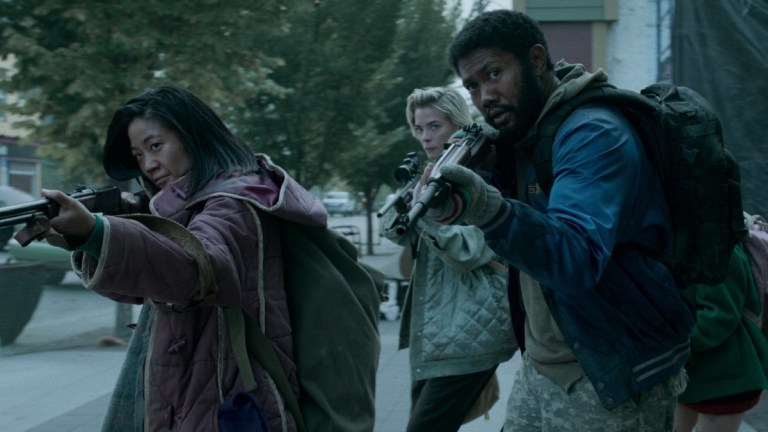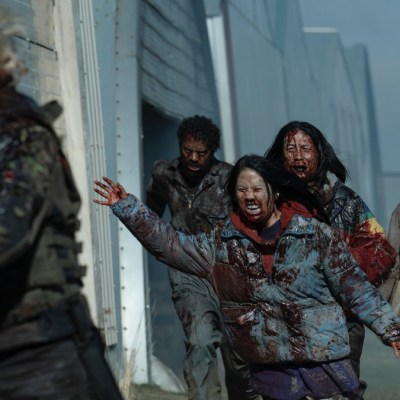How Black Summer and Z Nation Tell Different Zombie Stories
Black Summer was announced as a prequel to Z Nation, but has become something entirely different. How does Black Summer differ from its parent series?

Independent film company The Asylum is best known, perhaps unfairly, for its “mockbusters”. Mockbusters are movies with titles like Transmorphers or Paranormal Entity that are designed to fool people into either making accidental purchases on home video or becoming intrigued enough to stop scrolling. These kinds of films are an acquired taste, but they’re usually low budget fun with some sort of twist on the concept being mockbusted. Typically these movies end up on Syfy where they’re successful enough that the company makes money. Or at least they must make money because when The Asylum was looking to branch out with original ideas not echoing upcoming big-budget movies, Syfy was willing to take a gamble on Z Nation.
As far as Syfy titles go, Z Nation was a remarkable hit. The show did well enough to make it five seasons, morphing from something that straddled the line between campy fun and a character study with surprising depth considering its origins. Z Nation was never going to reach the ratings heights of The Walking Dead, but unlike the series it effectively mockbusted, it was fun, inventive, and never afraid of being funny in between ominous mentions of the events of the “Black Summer”.
That’s the word the survivors came up with to describe the first summer of the zombie outbreak in which 95 percent of the world’s population died off, and it’s clear from even a cursory glance at that percentage that Black Summer was no laughing matter, even if zombies could be. That’s why when Netflix announced a Z Nation spinoff titled Black Summer, the name promised something diametrically opposed to the story of Murphy and company.
Black Summer Is No Laughing Matter
If nothing else, Z Nation was funny. It might not be everyone’s cup of tea, but it tended to find the correct balance between gore and fun, akin to Zombieland, while still maintaining an overarching plot where the survivors were trying to get the only person immune to zombie bites to the last-known CDC facility in California. Sure, people die along the way, but the major plot is a mission of hope and the ability to save the world. Essentially, Z Nation is the point in which the apocalypse stopped being terrifying and started to just be very inconvenient.
Black Summer is decidedly not that. There’s no hope or levity, only the drive to avoid the undead while trying desperately not to starve. The moments of hope are few and far between, and all of them are bought with suffering, blood, and pain. There’s a light at the end of the tunnel on Z Nation, while Black Summer is akin to being buried under the rubble of a tunnel collapse. This is the worst part of the apocalypse, and the part The Walking Dead (and Fear The Walking Dead) mostly skipped over. Gangs of armed men kidnapping women for unsaid but obviously unsavory reasons isn’t exactly a TV friendly meet-cute, and Robert Kirkman’s televisual universe keeps its horrors mostly within the purview of the special effects department to avoid trigger warnings.
Z Nation Has Newmerica, Black Summer Has Entropy
Z Nation’s starting point is roughly four years after the events of Black Summer. Society has started to rebuild, after a fashion. There are merchants selling goods. There are multiple remnants of the United States government attempting to reassert control from within command bunkers. Organized gangs and cults have carved out kingdoms in the ruins, bringing something resembling peace and order back to what is left of the world. From his outpost in the Arctic, Citizen Z is able to provide guidance, direction, and support for Warren, Doc, and 10K on their journey. Civilization has returned to the point that when Murphy goes rogue, Citizen Z is able to put a bounty out for his capture, and there are organized groups up to the task. There are people doing actual good in the world of Z Nation, even if it’s for selfish reasons.
There’s no such organization or overwatch in Black Summer, which is six weeks to three months or so from the start of the outbreak. There might be a gang of five or ten people, but they’re certainly not looking to set up a farm stand to sell their crops. If the government exists and is giving orders after the first episode of Black Summer, no one is listening. The military is gone. Police and civil authorities are absent. There’s not even organized crime, just disorganized gangs killing and dying over canned goods. Trying to help other people in the world of Black Summer is a great way to get yourself killed or eaten, and every alliance of like-minded people seems to only cause trouble. Mysterious deliveries of food and supplies turns missions of mercy into killing fields as people fight over precious resources that might never come again, rather than cooperate and share.
Are Z Nation and Black Summer Actually Connected?
This question is a bit complicated. To quote Rev. Lovejoy from The Simpsons, ”Short answer, ‘yes’ with an ‘if.’ Long answer, ‘no’ with a ‘but’.” Black Summer was announced as a spinoff, the Z Nation equivalent of Fear the Walking Dead. Most of the writing and production staff are Z Nation veterans, with Z Nation creator Karl Schaefer teaming with Z Nation writer, co-executive producer, and director John Hyams to create Black Summer. Black Summer’s other co-executive producer, director and writer, Abram Cox, also did the same tasks on Z Nation. Z Nation creator Craig Engler gets a “based on” credit. However, while the two series are clearly related behind the camera, that DNA doesn’t translate onto the screen.
When asked directly if the two shows are connected, actress Jaime King told Screenrant “It’s interesting because people started tying [Black Summer] to Z Nation and I’m like this has nothing to do with that. It’s not a link to Z Nation.”
When Black Summer was announced at the 2018 Comic Con, creator Karl Schaefer had a different opinion, saying, “There’s going to be a spinoff of Z Nation on Netflix. It’s called Black Summer. It’s a prequel to Z Nation.”
Producer and writer on both shows, Jodi Binstock, summed up the possible relationship of the two shows up neatly when she told Syfy Wire, “Really, the only similarity between Z Nation and Black Summer is that the Black Summer is the first summer that Z Nation took place in.”
Every mention of the events of Black Summer on Z Nation comes in the hushed, pained tones of someone reliving their worst trauma. Certainly, Black Summer isn’t the backstory of the characters on Z Nation, but it doesn’t need to be. If 10K and Addy went through something half as bad as Spears, Rose, and Sun have, it’s no wonder the apocalypse turns weird four years on. Trauma manifests in unusual ways, and Z Nation is an unusual show.
Despite sharing a creative team, Black Summer and Z Nation are completely different programs that cater to different audiences. If you want The Walking Dead but funny, Z Nation is going to be the right choice. If you want Fear The Walking Dead except with the guts to show the true horror of societal collapse, then you’ll want Black Summer. Different strokes for undead folks.

